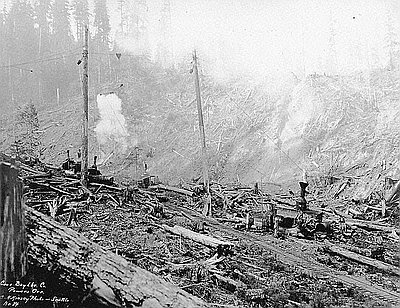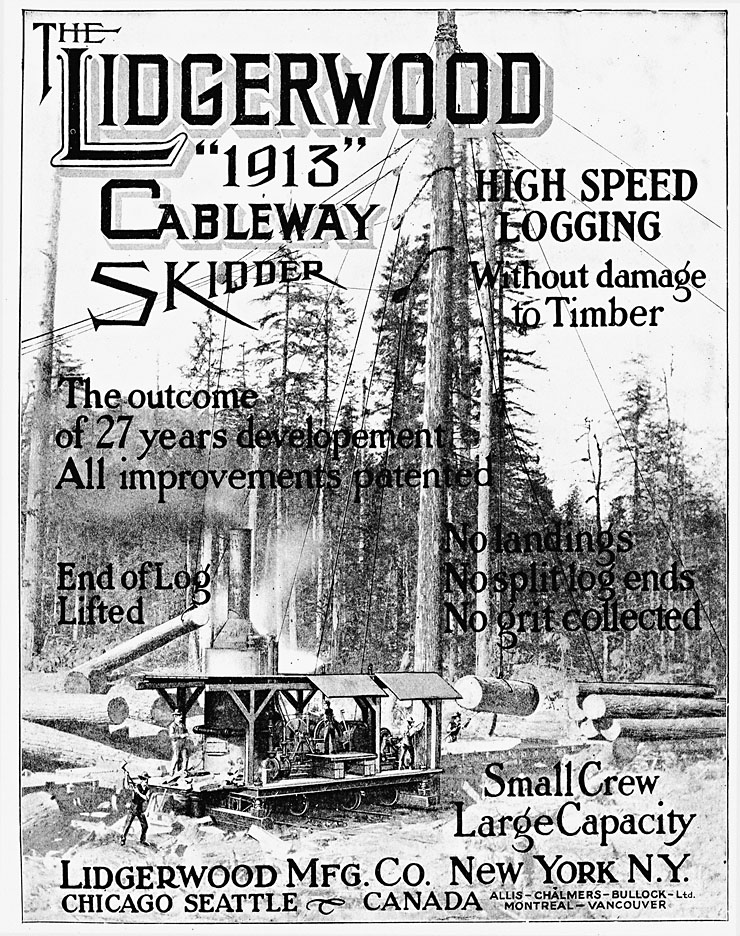- Catalog No. —
- OrHi 55208
- Date —
- 1913
- Era —
- 1881-1920 (Industrialization and Progressive Reform)
- Themes —
- Science, Medicine, and Technology, Trade, Business, Industry, and the Economy
- Credits —
- Oregon Historical Society
- Regions —
- Central Coast Southwest Willamette Basin
- Author —
- Timberman Magazine, 1913
Lidgerwood 1913 Cableway Skidder
Overhead yarding systems greatly accelerated the pace of work in the woods during the first decades of the twentieth century. This important technological innovation allowed timber workers to move logs from the stump to a central loading area without having to drag them across the ground. This was achieved by suspending the logs on cables strung overhead, then pulling them through the air with a steam-powered engine to a landing, where they could then be loaded onto railroad cars or pushed into streams for water transport to the mill.
The Lidgerwood company was one of the first to offer overhead yarding systems to the timbermen of the West Coast. Early Lidgerwood systems were prone to breakdowns due to the size of West Coast trees as compared to those in the Midwest where the technology was first developed, but the company came out with a system designed for West Coast conditions in 1912, a year before the advertisement reproduced here was published in the Timberman magazine.
Overhead systems were more versatile than ground yarding, which was limited to relatively flat terrain. They were also much faster, more than doubling the speed of yarding operations. Equally important for timbermen was the fact that a large number of skilled positions could be eliminated. Notice that the ad boasts “small crew, large capacity.”
In addition, overhead systems diminished the authority of the hooktender, who previously had set the pace of work in the woods. With the adoption of steam donkeys and overhead yarding systems, machines increasingly began setting the pace.
Further Reading:
Rajala, Richard. Clearcutting the Pacific Rain Forest: Production, Science, and Regulation. Vancouver, B.C., Canada, 1998.
Cox, Tom. Mills and Markets: A History of the Pacific Coast Lumber Industry to 1900. Seattle, Wash., 1974.
Written by Cain Allen, © Oregon Historical Society, 2003.
Related Historical Records
-
Coos Bay Lumber Company Steam Donkeys
The steam donkey, invented in 1880, greatly increased the efficiency of logging operations in Oregon’s forests. It replaced animal labor, which could not work as fast in rainy …

-
Mining, Lumbering, and Shipbuilding
The southern Oregon Coast between Coos Bay and Gold Beach experienced an early and mostly unproductive mid nineteenth-century gold rush, which gave Gold Beach its name. The gold …
